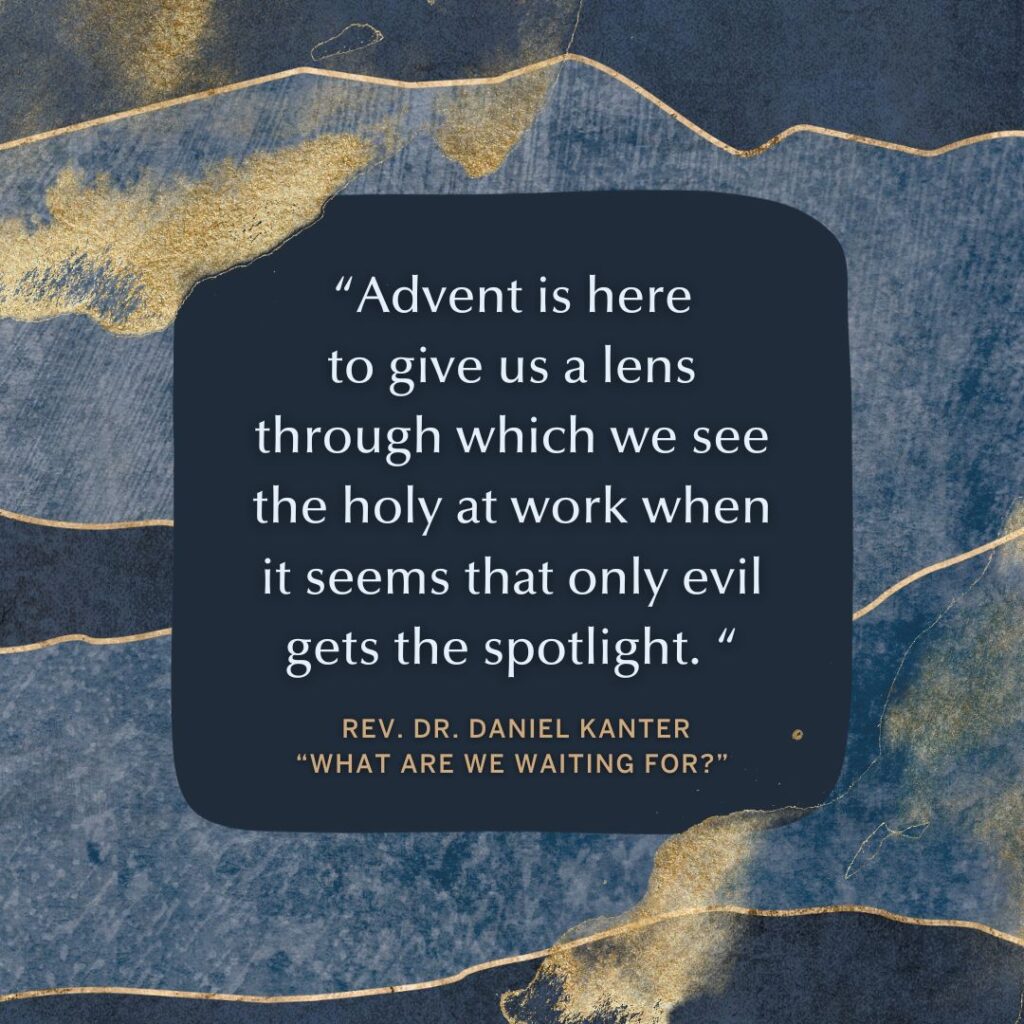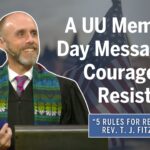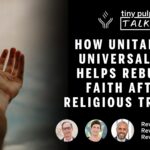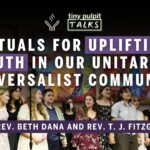What Are We Waiting For? | Rev. Dr. Daniel Kanter | 12.03.23

Advent themes are often apocalyptic but are they predictions or demands on our spiritual lives?
Sermon Transcript
Questioning the concept of the end times and the fear it instills
Driving down the tollway this week, I saw it, the coming of the end. There it was in full, colorful, digital blaring reality coming across our windshields. The message so clear I almost crashed my car into other onlookers. The billboard said, “Are we living in the end times?” with a picture of a local Baptist minister smiling like the cat that got the canary and pointing like God reaching out to Adam.
Are we living in the end times? What he means is are we ready for the complete destruction of the world with the second coming of Jesus who will come through the clouds with an AK-47 ready to demolish all unbelievers. “Jesus, don’t shoot.” I say, “I believe.” Maybe not the way that minister believes. I believe in your message, Jesus, not the veiled threats of you coming back to smote us. I believe in radical love. I believe what saves us is how we cut through the BS to help people in real need. I believe in the deep goodness of all, even when our moral goodness fails us. Can I get an amen from the back there?
So what is this end times thing, Mr. Smiling Baptist minister on a billboard? And yes, I have billboard envy. I have some of my own I’d like to put up around Dallas. Like “You don’t have to be saved, you already are.” Or another one that says, “A church that cares how you love not who you love.” Or maybe one that says, “He might get you, but we got you.” No smiling minister, but all of us welcoming people. I’m not kidding. If you want to fund this, talk to me after.
Analyzing the biblical passage on Advent and the signs of the end times
But back to our end times billboard. The passage we read today, the Advent passage from the Bible that T.J. read or some version of it will be read by Christian churches, the world over today.
The end is near. Signs in the sun, the moon, the stars, and on earth to stress among nations confused by the roaring of the sea and the waves. People will faint with fear and foreboding of what is coming upon the world for the powers of the heavens will be shaken and churches the world over will hear this and see wars in the Holy Land. Earthquakes and volcanoes and floods on every continent. The Texas Rangers won the World Series. They will see that all the news can talk about this week is whether Taylor Swift is going to the Packers game, and they will say, “Signs and symbols, the end is near.” Now, in all seriousness, we could have our own list. Nazis waving flags outside our neighboring congregations. A few weeks ago, at the Cathedral of Hope and last week at Temple Emanuel, I’ve reached out to the minister and the rabbis, and we are rallying to support one another. Three young Palestinian men shot outside my alma mater in Vermont. Thank God they are recovering. Anti-Semitism and anti-Palestinian sentiment rages on end times.
Nationally, we are being torn apart by complicated events that are happening thousands of miles away that we might not really fully understand. But what we do understand is that extremists of any kind can tear at the fabric of society, the society we desire. The peaceable kingdom, the godly queendom, the world we seek can look like the end when extremists or extreme events in our lives tear us apart. End times, the mistake in the kind of preaching that will be heard most all over the world is that flat earth believing preaching that shortsighted preaching that will see this Bible passage and say, “All life is coming to an end and Jesus can tell the future.” No. This story was preserved for 2,000 years because it was talking to Christians who lived in hiding and were disenfranchised and lived under occupation and the violence of the Roman Empire. The passage is saying to them that life is temporary, that when all is gone, what will last, it asks.
The associated fear is real, it is saying. Because we all know loss and we know how that feeling of loss makes us fear feel like fear. C.S. Lewis had it right when he said, “Grief feels like fear. And loss tears of what we know, or we hope is permanent.”
The Real Threat: Losing Sight of What Matters
But what is really at risk? Whether we’re talking about your losses or your grief or what we see crumble in the world around us is losing our hope, losing our loves, losing sight of what matters. What is at risk when we buy into the end times kinds of fears that we lose those things, we lose our sight in what we love and who we love, what is possible. In short, we lose our faith in whatever way that you understand that. I understand it in a way that we lose our trust in the world, in kindness, and in each other.
And the story addresses this actually the one that T.J. read. It says, “Lift your heads. It gives us the answer.” It says, “Lift your heads. The answer is in your lives to heal divisions, to fend off trouble in the world.” Sometimes those things seem remote in times of struggle and severity. They seem out of reach when we grieve or shake our heads at the world, but they seem impossible only because we know them, but we forget to practice them. And I’m talking about the teachings that are right there in the accompanying stories in the Bible, the teachings of Jesus, the teachings of the Buddha, the teachings of Lao Tzu, the teachings of great-grandmother Tubman and Sarton and great-grandfather Gaddafi. Those teachings that tell us and remind us that we already know the answer to the fear and the end times. Love your enemies. Welcome strangers. Turn the other cheek. Give your cloak to those who are in need. Give because it feels right. Freedom is real. You can only change yourself and don’t let your enemy define you. I think that last one was from Karate Master Bruce Lee, but so be it.
Challenging Fear with Faith
The passage in today’s reading is saying, we hold on to fears because they define who we are. The barbarians are coming. But without them, we have no hope. We have no purpose. Fear takes away the one thing that really helps the world, that is really living your faith. There’s something more scary than all that is that we already know the answers on how to address these things. We know that we have to put ourselves in danger sometimes. We know that we might say the wrong thing at Christmas dinner. We know that we can be arrested for standing up for things that we believe in. We know that we can risk offending someone with our truth. We know that we have to love someone who is really difficult in our lives, and that’s part of the answer to the fear. The first Christians in the first century, they needed to hear about fear because their existence was in jeopardy.
They understood these things. They understood things fall apart. Things crumble in the world, and they hoped for better. Do we wish that all will be well and all will be well, and all manner of things will be well? Yes. I also wish I had no Christmas preparations to make. I also wish the Nazis would all die suddenly, and the world would be at peace. What I realized in reading this passage today of the apocalyptic Jesus was that what will destroy us isn’t what we think will destroy us. Losing jobs, death in our lives, storms. What will destroy us is losing sight of how to make the world better and letting fear cripple our resolve. Certainly, there’s a lot to fear. There are a lot of forces against radical love in the world. There are a lot of guns. There are a lot of churches right now this week holding militia night, recruiting nights, believe that? It’s happening.
There are Christian nationalists who are cheering the election of a speaker of the house who believes that you should have no rights, that you should not exist, and that the last election was stolen. The fear is real. The barbarians are coming. And each of us, we’re waiting for something new to be offended by. Some new enemy, some moment of cataclysm, some burst in the sky, a climate collapse that happens in one day. But those are things, those are barbarians that are defining us.
Now, for those of you who have to leave a sermon having learned something, I’m going to give you this piece. The word barbarian is derived from ancient Greek word barbaros. It means foreigner or specifically someone who can’t speak a language that you speak. It means fear of the unknown. When we fear those barbarians, the foreign, the people in our lives who speak different languages or hear different words or watch different news, networks.
Advent as a Lens for Transformation
The real message today is don’t give in to what will destroy you, neither people or fear or business or guilt or pleasures of any kind. Today’s message is calling you to a bold faith to become a community here of dissent that testifies to the goodness and justice and love that fights back fear and arms and the way we define enemies wherever we go. Through whatever happens, we will continue this church to serve people who are pregnant, need help. We will continue to do advocacy in the face of authoritarianism in our state and nation. We will continue not to hide our support of trans and gay and lesbian people with courage. Together, we will continue to keep the complexity of the world’s affairs among us and not promote hate of each other. As the days darken, we reject fear and everything else on the list of today’s readings. Because for us, Advent is full of the present and not yet God’s kingdom. Advent is about the tension between our reality and a holy vision for the future.
Advent is about waiting, but it should also help us get a sense of what it feels like to be secure in what is to come yet still have to wait. Advent is here to give us a lens through which we see the holy at work when it seems that only evil gets the spotlight. To assure us that there is a future that breaks into the present that really changes our here and now, Advent is here with its rich stories to remind us that beginnings and endings are related and that often endings are the beginning of new things. I love Advent because I love Christmas. Not for all its flat interpretations, but for the rich stories that call us to our better selves and challenge us to live our ideals and maybe beyond all the dramatic flares.
This time of year is just asking us what is ending in our lives to allow new beginnings. So to the Baptist minister on the billboard I say, “With you up there smiling over the tollway, it feels like the end times, but we will not live in fear. We will not let the barbarians defined who we are. We don’t care what you say. What we care about is practicing radical love for all we can. Go and do likewise, amen.”








